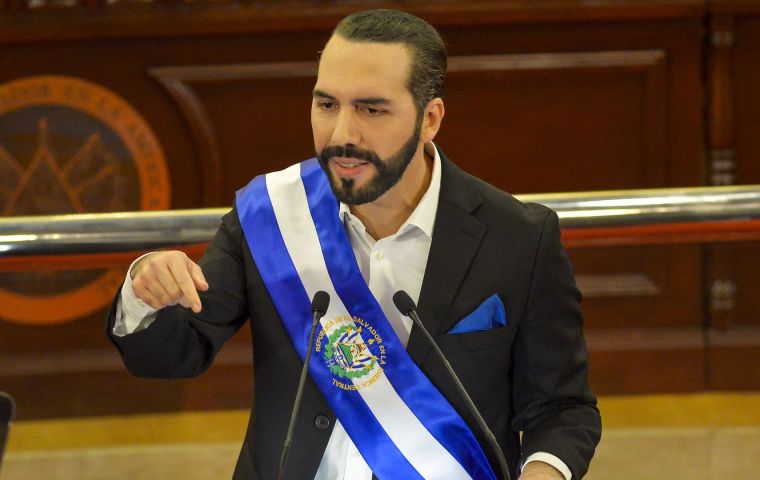MercoPress. South Atlantic News Agency
Bitcoin legal tender in El Salvador, first country ever
 President Bukele endorsed the adoption of Bitcoin as legal tender
President Bukele endorsed the adoption of Bitcoin as legal tender The Parliament of El Salvador has passed with 62 out of 84 votes a bill submitted by President Nayib Bukele to classify Bitcoin as legal tender, thus becoming the first country in the world to adopt a cryptocurrency. Its use as legal tender will go into law in 90 days.
The measure, which was approved late Tuesday, has raised concern abot its possible effects on the country's status with the International Monetary Fund (IMF).
“The #BitcoinLaw has just been approved by a qualified majority” in the legislative assembly, President Nayib Bukele tweeted after the vote in the assembly.
Bukele has touted the use of Bitcoin for its potential to help Salvadorans living abroad send remittances back home while saying the US dollar will also continue as legal tender. “It will bring financial inclusion, investment, tourism, innovation and economic development for our country,” Bukele said in a tweet shortly before the vote.
The President added that the use of Bitcoin shall remain optional and it will not entail any risks to users. “The government will guarantee the convertibility to the exact value in dollars at the moment of each transaction,” Bukele said.
El Salvador’s dollarized economy relies heavily on money sent back from citizens working abroad. World Bank data showed remittances to the country made up nearly $6bn, about a fifth of GDP, in 2019, one of the highest ratios in the world.
Experts have said the move to Bitcoin could complicate talks with the IMF, where El Salvador is seeking a more than $1bn program.
The IMF’s head of mission for El Salvador, Alina Carare, said late on Monday that the fund is “following the news and will have more information as we continue our consultations with the authorities.”
Carlos de Sousa, a portfolio manager at Vontobel Asset Management, said the Bitcoin push looked ill-considered with Bukele potentially shooting himself in the foot by making the raising of tax revenue more difficult. “Cryptocurrencies are overall a very easy way to avoid taxation and a very easy way to simply avoid the authorities because it’s a completely decentralised system, you can do money laundering, you can do tax avoidance and so on,” he said.
A cryptocurrency is a digital form of money that can be used to pay for some transactions online. As with “real” currencies, one, 10, or millions of Bitcoins can be owned. Unlike real currencies, cryptocurrencies only exist online and are not backed by any government or central bank. Crypto devotees say the currencies represent the economy of the future. But ultimately, their value depends on their limited supply and the number of people who chase after them.
The cryptocurrency market grew to more than US $ 2.5 trillion in mid-May last year, according to the CoinMarketCap page, driven by interest from increasingly serious investors from Wall Street to Silicon Valley. But the volatility currency – currently priced at US $ 36,127 – and its murky legal status has raised questions about whether it could ever replace fiat currency in day-to-day transactions.




Top Comments
Disclaimer & comment rulesCommenting for this story is now closed.
If you have a Facebook account, become a fan and comment on our Facebook Page!